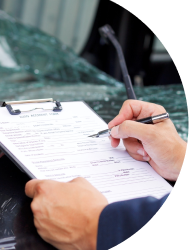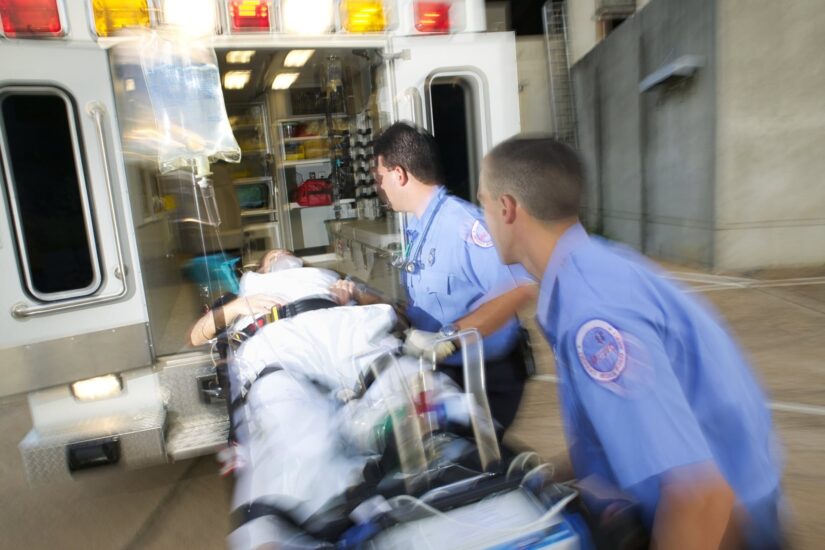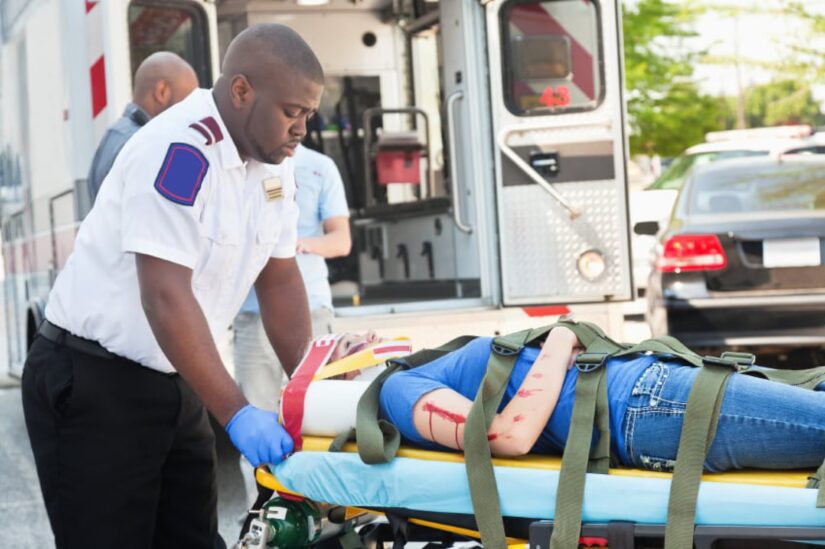In the moments after a car accident, you will, unfortunately, have a lot to think about, and many decisions to make — all while you are trying to come to terms with the reality of the situation, and manage any injuries that you or your passengers may have suffered. You will have police asking you questions, the other driver needing information, statements that you will need to make, contact information to collect from eyewitnesses, and more. At the same time, the EMTs will be examining your injuries and will ultimately make a recommendation about whether or not they believe that you need to take an ambulance to the emergency room. When first asked this question, people naturally start thinking about the exorbitant price tags that come along with ambulance rides, and this causes many people to reject the suggestion and leave the scene of the accident on their own, even though this decision may be very detrimental to their health.

Car Accident Checklist
Download a copy of our FREE car accident checklist
If you have suffered serious injuries, or if you are unconscious, then you are taking a ride in the ambulance whether or not you want to; however, if you are conscious and are feeling on the fence, or if you are uncertain about the extent of your injuries, you will have to make the call on your own. This decision can be wracked with worries about cost, about long-term financial impacts in terms of medical bills and debts that you owe, and more. This type of stress only serves as an additional complication in an already overwhelming situation, so your best bet is to listen to the advice of the EMTs and follow their lead.

If You Have Taken an Ambulance After an Accident, Contact Fasig | Brooks Today For a Free Consultation About Your Legal Case
It is well known that ambulances are expensive in the United States, but if you are injured in an accident and require immediate medical attention then you may not have an option – not to mention the fact that this is the safest decision for an effective emergency treatment. If you have medical insurance, you may be able to seek reimbursement to cover the cost of this ride, but if you are uninsured then this bill can become a significant problem for you. Additionally, if you have been hurt in an accident that someone else caused, then you will need to seek compensation from the responsible party’s insurance company. Ambulance costs are covered under economic damages, which are a piece of the overall compensatory damages that you will seek from the defendant and their insurance representatives.
Trying to understand the best way to get the money that you need to pay for an ambulance ride can be complicated, especially while you are in the early days of recovering from the injuries you suffered in the accident. The team at Fasig | Brooks offers a free initial consultation for people who have been hurt in accidents, where we can talk about the entirety of your situation and go over your potential case together. At the end of our consultation, you will have a much better idea of the benefits of working with a personal injury attorney and can make a more informed decision about what you will do next.
Read more below to get a better idea about whether or not you should take an ambulance to the hospital after an accident, and contact us as soon as possible if you would like to discuss your options for the future with an experienced legal professional.
Consult With EMTs About Their Suggestion About Taking an Ambulance
After an accident, your body will be in “flight or fight” mode, meaning that you will be coursing with adrenaline – a highly effective pain reliever. Oftentimes, victims of accidents will downplay the severity of their injuries at the scene of the accident – either consciously or subconsciously – because of their heightened state and high levels of adrenaline, only to discover the next morning that they are in serious pan. One of the best things that you can do after an accident is to let the EMTs examine your injuries closely at the scene of the accident so that they can get a better sense of your situation. Remember: there is no honor in “shaking it off” after an accident, especially one that someone else caused – you deserve to get medical treatment for the injuries that someone else’s negligence and recklessness caused, and the insurance companies involved in the aftermath will not reward you for your stoicism. In fact, they will attempt to use anything that you say against you if you made dismissive comments about your condition on the accident report.
The EMTs on the scene are highly skilled professionals and will be able to give you a good sense of your condition, If they are suggesting that you take an ambulance to the emergency room, it will be a good idea to at least listen to their suggestions and understand more about why they are making this suggestion. They are not incentivized to bring you in the ambulance to the hospital, so you will not need to worry about their suggestions being financially motivated – at least not personally.

Ambulances Are Equipped To Provide You With Immediate Care
If the EMTs, firefighters, or police at the scene of the accident think that you should take an ambulance to the emergency room, it is probably for a good reason. Once you are in the ambulance, you will have access to professionals who are monitoring your pain and condition until you get into the hospital, at which point you will be seen by emergency medical staff in order to get more comprehensive care and treatment. If you were to choose to leave the scene of the accident, either to go home or to drive yourself, this time away from medical professionals could have a serious impact on your situation. Things like internal bleeding and traumatic brain injuries can complicate rapidly, so staying under the care of these professionals every step of the way is a safe decision to make.
Remember when you are deciding whether or not to take an ambulance that your refusal will be used by the insurance company to indicate that your injuries were not that serious. If the other driver caused the accident, then there is little reason to skip getting the best care possible, because you and your personal injury attorney will be able to fight to recover these costs, and you can be confident that you are getting the best emergency care possible.
What To Do If you Decline an Ambulance
If you decide that you do not want to take an ambulance to the hospital, this does not mean that you should skip seeing a doctor entirely. In fact, one of the first things that you should do after any accident is to schedule an appointment with your primary care physician so that you can have a comprehensive check of all of your injuries. This appointment comes with a few benefits, including the most obvious benefit of getting medical care, but equally important is that it establishes documentation that will prove each injury you report in your personal injury claim. The longer you wait to see a doctor, the more complicated your injuries can become, and the easier it will be for the insurance company to deny compensation for them by claiming that there is no proof they are from the accident.
There are certain instances where a victim is injured and does not realize it – sometimes it takes days, and other times it can take even longer before they realize they are hurt. For instance, whiplash is a soft tissue injury caused by the head being jerked forward, down, and back as a driver or passenger is slammed against the seatbelt. Just like it takes a day or two after an intense workout to truly feel the soreness, this injury will have a bit of time before you will know the full extent of it. If you think that you have whiplash, or even if you just know that your head was jerked around even if you don’t feel any issues yet, make sure that you mention this to the EMTs and the police officer who is filling out the accident report. The more evidence of your injuries is available in the initial reports, the better.
It is understandable that for minor injuries where you can leave under your own power that it is unnecessary to take an ambulance. It is very important, though, that you see your doctor as soon as possible. At the very least, they will be able to confirm that your injuries are not serious; however, if your injuries do turn out to be measurable or ongoing, these initial meetings will provide valuable proof that your attorney can use to create a timeline of your damages.

Recovering Compensation For an Ambulance Ride Through a Personal Injury Claim
After you have gotten your immediate treatment, one of the next steps to take is to contact a personal injury attorney as soon as possible, if possible even before you speak with any insurance companies. When there is an experienced attorney representing your case, you can be confident that each communication between your legal team and the insurance company will be handled with experience and expertise so that you don’t need to worry about the insurance agent trying to trip you up or extract misleading statements that they then construe as an admission of fault. No matter how pleasant the insurance agent is that is assigned to your case, it is important that you always remember that they are working on behalf of the insurance company and attempting to limit your claim as aggressively as possible.
When you have an attorney handling your claim for you, they will be able to go through the range of damages that you have suffered – both economic and non-economic – in order to calculate a fair amount for your settlement. During this time, the claims adjuster assigned to your case will be performing their own investigation, but they will be looking for every way to limit your claim. When the insurance company makes its initial offer, you will be shocked at the difference between the calculations your lawyer came up with and the offer that they are making you. In exchange for this paltry one-time sum, you will need to waive your right to any future legal action against the insurance company or their client for this accident, whether or not any additional complications were to arise. However, your attorney will simply use this initial offer as the start of their negotiation process in an attempt to reach an out-of-court settlement.
Your attorney will work to reach a settlement agreement directly with the insurance company before filing a lawsuit in the Florida courts. Oftentimes a settlement is ideal because it avoids costly and time-consuming court dates, but this decision is specific to your circumstances and your attorney will help you understand what they believe is the best approach.

Economic Damages
Economic damages are the basis of your claim and include things like your ambulance ride and all other medical bills, as well as any impacts on your income or earning capacity. Economic damages seek compensation for all impacts that have measurable dollar values associated with them and seek a 1:1 repayment for them. For example, if your medical bills amount to $50,000 including your ambulance ride, then you will seek exactly that amount.
There are many other economic damages that are less obvious that your attorney will help you understand and calculate, as well, each of which the insurance company would never offer to pay if you did not negotiate for it.
Non-Economic Damages
Non-economic damages are more complicated than economic damages, simply because they seek monetary payments for damages that have no measurable monetary value. These types of damages include things like the actual pain and suffering you have experienced, as well as other emotional, psychological, and physiological impacts of your accident. These damages are often calculated using a multiplier that assigns a number along a scale (often 0 – 5) and is then multiplied using your economic damages. Using the multiplier method, $100,000 of economic damages, and a 3x multiplier would result in $300,000 of non-economic damages.
There are many other methods for calculating these types of damages as well, and your attorney will identify the most appropriate for your situation in order to get you the most money possible.









